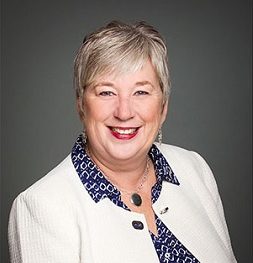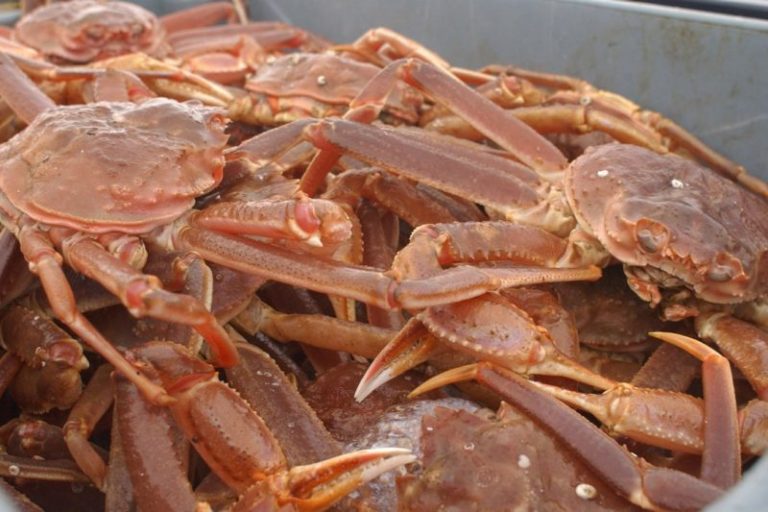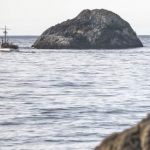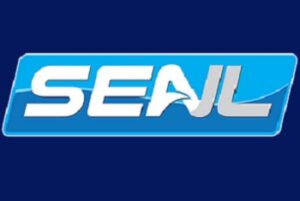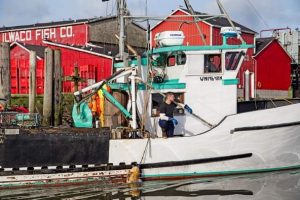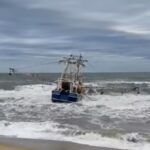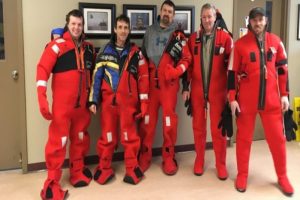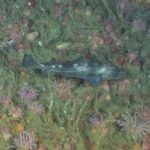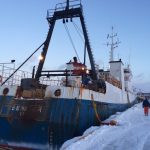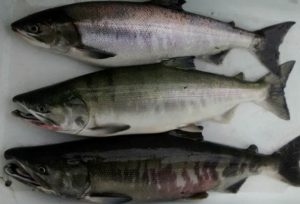“Everybody who has ever been a fisherman was drawn to it because of the freedom,” Erikson said. “The freedom to be your own boss, the freedom to be responsible to no one but yourself.” But money, freedom or even a viable living from the sea are in increasingly short supply on the B.C. coast, especially for young fishermen, said Jim McIsaac, vice-president of the Canadian Independent Fish Harvesters’ Federation. The number of people that can fish for a living is dropping because the cost of buying or leasing the Individual Transferable Quotas (ITQs),, The problem, McIsaac said, is that on the West Coast of Canada, the ownership of fishing licences and ITQs are not limited to fishermen.,, The federal government’s response,,, >click to read< 08:40
Tag Archives: quota
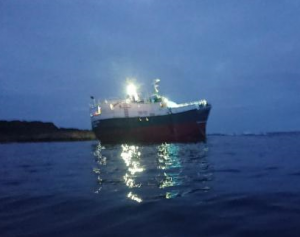
Delicate ecosystem of fishing industry must be maintained
From my office window in Lerwick Harbour I can see vans from a range of different marine and electrical engineering companies parked next to whitefish vessels while repairs and servicing work are carried out on board. Those same companies, which provide highly skilled employment of the sort that keeps young people in our community and lay the foundations for a strong future, support the pelagic and inshore fleets. Take away any of these fleets and our vibrant engineering sector would be unsustainable. Simon Collins, >click to read< 15:27
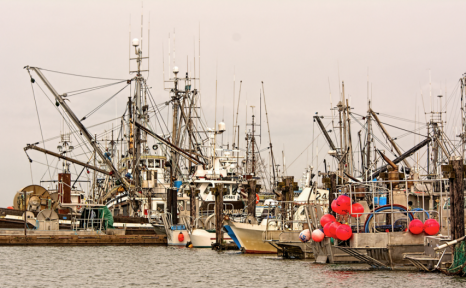
Sweeping reforms to West Coast fisheries recommended
Canada’s West Coast fishery could be in for a sea change, if Parliament accepts and implements 20 recommendations being made by the Standing Committee on Fisheries and Oceans.,,, recommending sweeping changes to the way commercial fishing licences and quota are owned in B.C.,,, including quota ownership by foreign investors who may never have set foot on a fishing boat or in Canada – that has turned commercial fishing in B.C. into “a modern day feudal system.” “The direction that the industry is going is driving the independent harvester – the small boat fisherman, the Ma and Pa operations – out of business on the coast.” The ownership of licences and quota in B.C. is different from Atlantic Canada and Alaska, where the people who do the fishing – commercial boat owners – tend to own the licences and quota. >click to read<23:14
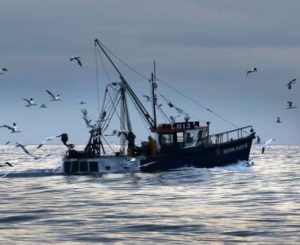
Brian Wilson: The scales must fall from our eyes
The Scottish fishing industry is in the hands of a wealthy few – but will Brexit, whatever form it takes, change anything, asks Brian Wilson Let’s be honest – the vast majority know little about the fishing industry while evincing general sympathy towards those who go to sea in order to put food upon our tables. When fishermen protest about the Common Fisheries Policy they tend to benefit from that empathy because it is easier to concur that “Brussels is to blame” than look for villains closer to home. >click to read<16:03

New York State petitions feds demanding more equitable fluke quota
New York State on Friday filed a petition with the federal government to demand a more equitable distribution of the commercial fluke quota, saying current rules put “unreasonable limits” on the state industry.,, “The stringent limits on commercial landings of [fluke] in New York ports have made [fluke] fishing no longer an economically viable choice” for New York fishermen, because the “limited revenue generated by a trip often cannot offset the costs, including fuel, time, and vessel wear-and-tear.” >click to read<18:21
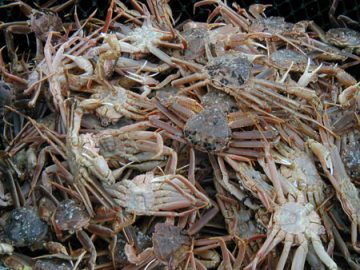
Bering Sea snow crab fishing underway
Bering Sea snow crab fishing was just getting underway, and the first deliveries were expected later this week, according to Ethan Nichols of the Alaska Department of Fish and Game in Unalaska/Dutch Harbor when the snow crab quota was cut back again this year by the Alaska Department of Fish and Game. There is a reduced Bering Sea Tanner crab season, thanks to new rules allowing fishing when fewer female crustaceans are present. And small boats in the Unalaska Island area have a Tanner fishery for the first time in two years. >click here to read<13:03
Maine Elver lottery gets under way Wednesday
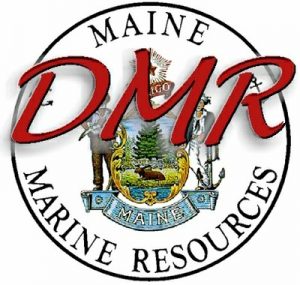 For the first time in more than four years, a few new Maine residents will get a chance to participate in the elver fishery. On Wednesday, the Department of Marine Resources will open a lottery for at least seven new licenses to be issued for the 2018 elver fishery. The season begins on March 22. Each new license holder will be allotted a minimum of 4 pounds of the state’s aggregate elver quota. Based on the average price for the 2017 season that ended in June, that would be worth some $6,000. click here to read the story, details, and good luck! 17:18
For the first time in more than four years, a few new Maine residents will get a chance to participate in the elver fishery. On Wednesday, the Department of Marine Resources will open a lottery for at least seven new licenses to be issued for the 2018 elver fishery. The season begins on March 22. Each new license holder will be allotted a minimum of 4 pounds of the state’s aggregate elver quota. Based on the average price for the 2017 season that ended in June, that would be worth some $6,000. click here to read the story, details, and good luck! 17:18
Alaska fisheries thrive — yet industry is on the edge
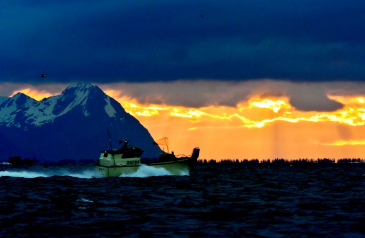 It has been a really good year across most of Alaska’s commercial fisheries. Salmon prices are up, harvests are good, fuel costs are down, and there’s more: The world’s appetite for nutritious, wild-caught Alaska fish, caught in clean waters, is growing. Alaskans’ track record for managing fisheries in a sustainable manner, both near-shore and further at sea, reinforces our reputation for responsible stewardship. Life is good.,,, Seafood employed 56,800 workers in 2015-2016 and this industry annually contributes $5.2 billion to the state’s economic output. But as good as this sounds, the fact is that this traditional industry is actually fragile,,, click here to read the story 21:45
It has been a really good year across most of Alaska’s commercial fisheries. Salmon prices are up, harvests are good, fuel costs are down, and there’s more: The world’s appetite for nutritious, wild-caught Alaska fish, caught in clean waters, is growing. Alaskans’ track record for managing fisheries in a sustainable manner, both near-shore and further at sea, reinforces our reputation for responsible stewardship. Life is good.,,, Seafood employed 56,800 workers in 2015-2016 and this industry annually contributes $5.2 billion to the state’s economic output. But as good as this sounds, the fact is that this traditional industry is actually fragile,,, click here to read the story 21:45
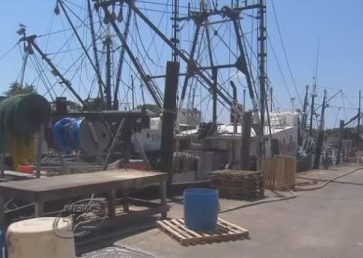
Fluke-catching quota costing fishermen thousands
Dozens of commercial fishermen say they are losing out on pay after they reached their state-imposed limit on how many fluke they are allowed to catch. Captain Roy Diehl says he and dozens of other commercial fluke fishermen are docked because they caught their allowed quota for the July-August season just two weeks after it opened. He says he blames the 30 percent quota reduction set by the Atlantic States Marine Fisheries Commission for this year. “What it does is it takes seven weeks of income out of everybody’s paycheck for the year,” says Diehl. “It’s pretty tough because there’s a lot of fluke out there and we can’t have them.” Video, read the story here 22:51
What Quota? Hawaii Longliners Are Fishing For Ahi Again
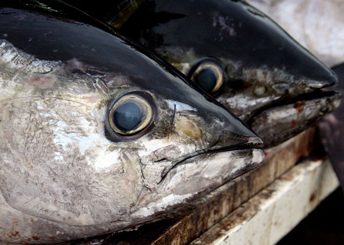 Hawaii’s longline fishermen are back at sea in search of more ahi after extending their quota limit through an agreement with the Commonwealth of the Northern Mariana Islands. The 2016 season had ended early, as it has for the past few years, when the longline fleet in late July hit its 3,554-ton limit for bigeye tuna in the Western and Central Pacific. The deal between Quota Management Inc. President Khang Dang and Northern Marianas Gov. Ralph Torres involves paying the territory $250,000 for 1,000 tons of its 2,000-ton limit. Under the agreement, QMI can assign its rights and obligations to the Hawaii Longline Association, a wholly owned subsidiary of QMI. The association is a nonprofit trade group formed to support the $100 million commercial longline fisheries industry, which includes a fleet of roughly 140 vessels ported in Honolulu. (the author seem to have an axe to grind) Read the story here 09:53
Hawaii’s longline fishermen are back at sea in search of more ahi after extending their quota limit through an agreement with the Commonwealth of the Northern Mariana Islands. The 2016 season had ended early, as it has for the past few years, when the longline fleet in late July hit its 3,554-ton limit for bigeye tuna in the Western and Central Pacific. The deal between Quota Management Inc. President Khang Dang and Northern Marianas Gov. Ralph Torres involves paying the territory $250,000 for 1,000 tons of its 2,000-ton limit. Under the agreement, QMI can assign its rights and obligations to the Hawaii Longline Association, a wholly owned subsidiary of QMI. The association is a nonprofit trade group formed to support the $100 million commercial longline fisheries industry, which includes a fleet of roughly 140 vessels ported in Honolulu. (the author seem to have an axe to grind) Read the story here 09:53
For Argyll: ‘a quarter of England’s entire whitefish quota is now owned by a single Dutch super trawler’
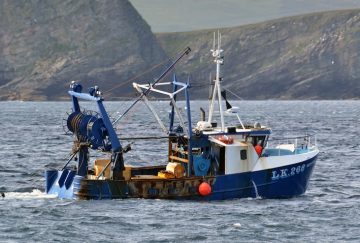 From the article: Back in 1970 when Britain applied to join the EU [then EEC], a new law was passed a mere six hours before official acceptance of our application. The Common Fisheries Policy [CFP], which confers ‘equal access to fishing grounds for all EU countries’, thus became part of the body of existing EU law, the so-called ‘Acquis Communautaire’, which new members are obliged to accept. The Heath government folded and accepted the heist, taking Britain into the EU on 1st, January 1973, thereby ceding control of Shetland’s [and UK] legendary fishing grounds to the EU.,, Fishermen must now land any unwanted catch ashore to be dumped – but it cannot be sold for human consumption and they are not allowed to give it away, not even to schools, hospitals or care homes. This is lunacy. At least, discarding fish benefits the marine food chain by removing large predators from the sea and returning them dead, for consumption by other fish and small marine creatures. However, any such benefits are lost if the fish are ferried ashore and dumped to landfill. Read the story here 10:21
From the article: Back in 1970 when Britain applied to join the EU [then EEC], a new law was passed a mere six hours before official acceptance of our application. The Common Fisheries Policy [CFP], which confers ‘equal access to fishing grounds for all EU countries’, thus became part of the body of existing EU law, the so-called ‘Acquis Communautaire’, which new members are obliged to accept. The Heath government folded and accepted the heist, taking Britain into the EU on 1st, January 1973, thereby ceding control of Shetland’s [and UK] legendary fishing grounds to the EU.,, Fishermen must now land any unwanted catch ashore to be dumped – but it cannot be sold for human consumption and they are not allowed to give it away, not even to schools, hospitals or care homes. This is lunacy. At least, discarding fish benefits the marine food chain by removing large predators from the sea and returning them dead, for consumption by other fish and small marine creatures. However, any such benefits are lost if the fish are ferried ashore and dumped to landfill. Read the story here 10:21
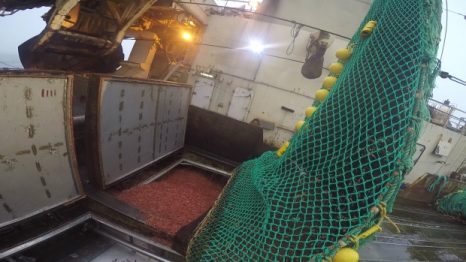
LIFO – Nova Scotia fish companies fight to keep northern shrimp quota in Area 6
Nova Scotia fish companies that pioneered the offshore northern shrimp fishery are fighting to keep their share of quota as the Trudeau government faces its first major fisheries decision in Atlantic Canada — one that pits province against province. The question is, who gets to catch a plummeting northern shrimp stock off Newfoundland and Labrador? “We’re being used to fix a problem we didn’t create,” said Andrew Titus, captain of the Mersey Phoenix, a Nova Scotia-based factory-freezer shrimp trawler. “If they change those rules, that is a direct hit to us … they want to kick us out of an area where we have been fishing since 1978,” said Titus, an employee of Mersey Seafoods. The so-called last in, first out policy — known as LIFO in bureaucratic jargon — has been used to manage quota sharing for decades, including the northern shrimp fishery. It means the last entrants to a fishery are the first out when a quota is cut. Read the story here 09:39
Just for the Halibut – Quota in the Gulf of St. Lawrence
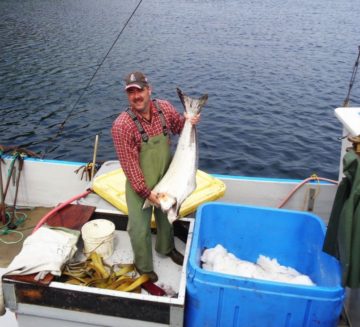 While most attention these days is focused on who should should get how much of a share of northern shrimp, the Department of Fisheries and Oceans is trying to decide how the Atlantic halibut quota in the Gulf should be shared between fishermen in the five Atlantic provinces. These days, fishermen who ply the waters in the Gulf of St. Lawrence, fetch anywhere from $6 to $7 a pound for halibut they catch on hook and line. The quota in the Gulf of St. Lawrence is limited — just over 800 tonnes for the past two fishing seasons — and is shared up between five provinces. Read the rest here 08:58
While most attention these days is focused on who should should get how much of a share of northern shrimp, the Department of Fisheries and Oceans is trying to decide how the Atlantic halibut quota in the Gulf should be shared between fishermen in the five Atlantic provinces. These days, fishermen who ply the waters in the Gulf of St. Lawrence, fetch anywhere from $6 to $7 a pound for halibut they catch on hook and line. The quota in the Gulf of St. Lawrence is limited — just over 800 tonnes for the past two fishing seasons — and is shared up between five provinces. Read the rest here 08:58
New Quota Closes Norton Sound Commercial Crab Fishery
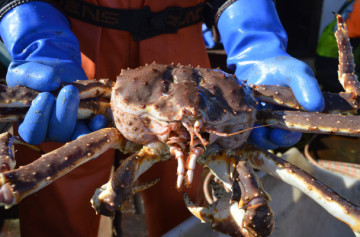 Norton Sound’s commercial crab fishery closed Thursday. In the first season shortened by a new quota, winter fishermen harvested the allowed 41,376 pounds of red king crab in just over a month. Jim Menard is the area manager for the Alaska Department of Fish and Game. He said the Board of Fisheries imposed the new quota to better balance the winter and summer crab catches. The quota shrunk the winter season by several months and cut the harvest by more than half, compared to last year’s record-breaking haul. Still, Menard said commercial crabbers have had a lucrative winter. Read the rest here 13:57
Norton Sound’s commercial crab fishery closed Thursday. In the first season shortened by a new quota, winter fishermen harvested the allowed 41,376 pounds of red king crab in just over a month. Jim Menard is the area manager for the Alaska Department of Fish and Game. He said the Board of Fisheries imposed the new quota to better balance the winter and summer crab catches. The quota shrunk the winter season by several months and cut the harvest by more than half, compared to last year’s record-breaking haul. Still, Menard said commercial crabbers have had a lucrative winter. Read the rest here 13:57
Tanner crab fishermen receive OK to catch quota
It’s official.  fishermen can catch their whole quota, and not leave 1.4 million pounds unharvested at the bottom of the Bering Sea because of a surprising provision in the federal rules governing the crab rationalization program that blindsided fishermen and processors late last year. That oversight nearly cost the industry some $5 million. That’s good news as the Tanner fishery moves along, with 72 percent of the eastern Tanners harvested as of Monday for 8.1 million pounds by eight boats catching an average of 37.4 crab per pot. Read the rest here 12:30
fishermen can catch their whole quota, and not leave 1.4 million pounds unharvested at the bottom of the Bering Sea because of a surprising provision in the federal rules governing the crab rationalization program that blindsided fishermen and processors late last year. That oversight nearly cost the industry some $5 million. That’s good news as the Tanner fishery moves along, with 72 percent of the eastern Tanners harvested as of Monday for 8.1 million pounds by eight boats catching an average of 37.4 crab per pot. Read the rest here 12:30
Stronger restrictions imposed on elvers, frustrating fishermen – Regulators also will keep a new quota system
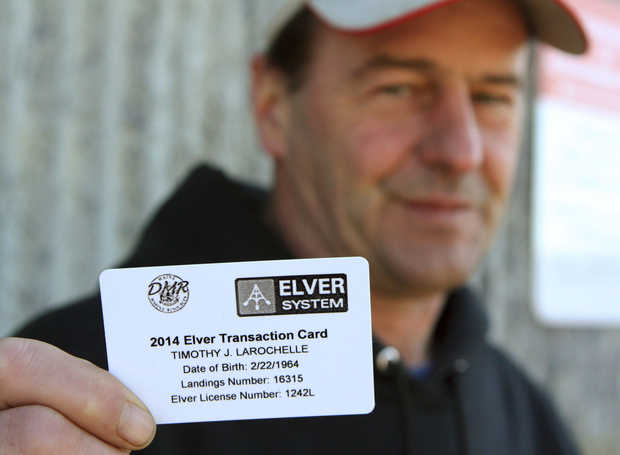 The decision affects the livelihoods of the hundreds of people working in the fishery, which has recently been the second-most valuable fishery in the state, behind only lobsters. This spring, the catch had an estimated value of $8.4 million. Read the rest here 09:30
The decision affects the livelihoods of the hundreds of people working in the fishery, which has recently been the second-most valuable fishery in the state, behind only lobsters. This spring, the catch had an estimated value of $8.4 million. Read the rest here 09:30
Weighing Anchor, But Much More to the Story
 There are many iconic skylines, but not many as proud and cherished as the stabilizer arms that reach above the fish markets from Menemsha’s sister draggers, the Unicorn and the Quitsa Strider II. Loved by their captains, the fishermen in the harbor and the tourists who lunch by their hulls, the two have written many chapters of the proud and storied history of commercial fishing on Martha’s Vineyard. Read more here 10:26
There are many iconic skylines, but not many as proud and cherished as the stabilizer arms that reach above the fish markets from Menemsha’s sister draggers, the Unicorn and the Quitsa Strider II. Loved by their captains, the fishermen in the harbor and the tourists who lunch by their hulls, the two have written many chapters of the proud and storied history of commercial fishing on Martha’s Vineyard. Read more here 10:26
CDQ group battles delegation over quota
 Alaska’s Congressional delegation is reluctant to talk about changes in the new Magnuson-Stevens Act until they’ve heard more from the state, but one thing is certain: they have no intention of changing the Community Development Quota allocations in the Bering Sea. more@alaskajournalofcommerce 13:21
Alaska’s Congressional delegation is reluctant to talk about changes in the new Magnuson-Stevens Act until they’ve heard more from the state, but one thing is certain: they have no intention of changing the Community Development Quota allocations in the Bering Sea. more@alaskajournalofcommerce 13:21
State Senate acts to protect bunker fishing in New Jersey
pressofAtlanticCity.com – New Jersey menhaden fishermen already face a big cut in catches this year, but the state Senate on Monday adopted legislation that would at least prevent boats from other states from poaching the Garden State’s quota. continued






